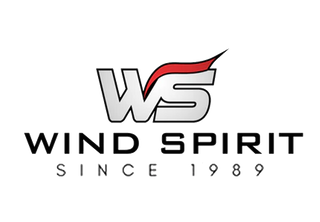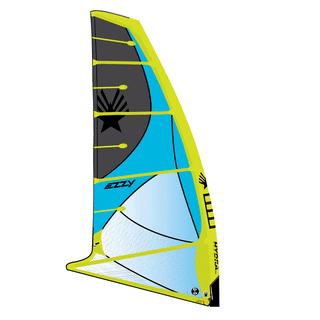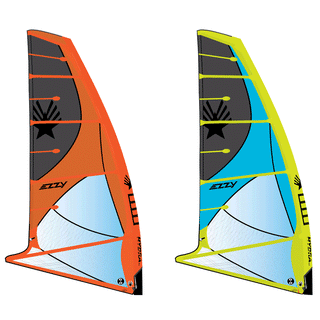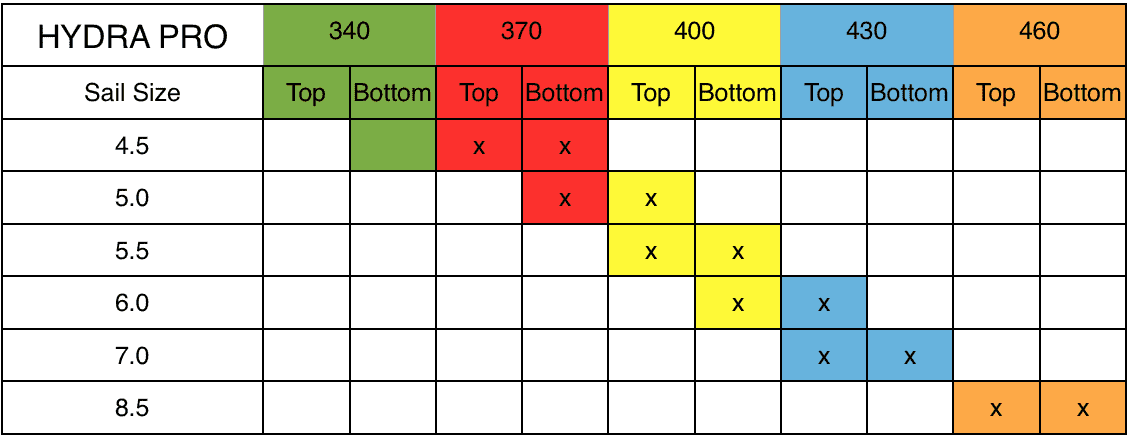EZZY WINDSURFING SAIL -
EZZY HYDRA PRO 2021 -
WHAT IS DIFFERENT IN A FOIL SAIL? FOILING V.S. NORMAL WINDSURFING
First off, because the foil can fly through the water with so little drag, the wind angles are different, which means that the apparent wind (the wind created by your movement) shifts forward. Second, you need a powerful sail to pump up onto the foil, but once you’re on the foil, you want a very easy to control, light sail. And third, your board is above the surface of the water when you’re flying on the foil.
EXTENDED FOOT BATTEN
The elongated foot on the Hydra Pro takes advantage of the board’s height off the water to create a hyper efficient sail. On a normal windsurfing sail, a long foot like this would hit the water when cruising and simply not work, but when foiling, we can take advantage of this “free” space created by flying above the water. The extra long foot forms an end-plate with the board. This is very similar to how winglets work on a jet wing, and aerodynamic theory tells us that an end-plate like this greatly improves the efficiency of the sail.
The extra long foot provides the needed low-end power to get up on the foil without using cambers or an extra batten below the boom, saving close to a kilo in weight. Being able to ride a smaller, lightweight sail makes foiling more fun by giving you the sensation of flying with nothing in your hands. You want a sail that “goes away.”
The extra long foot also makes the sail more stable. This means that you are less vulnerable to gusts throwing you off balance when you’re flying on the foil, which makes foiling a lot easier. But at the same time, because only the foot is extended and not the entire sail, the pull of the sail remains forward for a more comfortable sailing experience.
3/4 BATTEN
The Hydra Pro also borrows the 3/4 batten concept from our hardcore wave sail, the Taka. A 3/4 batten allows the sail to luff, which means that it can easily go from full to flat. This is important for many aspects of foiling. This helps the Hydra Pro to be extra powerful when you’re pumping it but flat and responsive when flying on the foil. And, the Hydra’s 3/4 batten is the reason it can de-power so easily and change its shape for the needs of the foil. When you sail up wind, you want a flat sail, and when you sail downwind, you want a full sail. The 3/4 batten allows both to occur without having to adjust the outhaul.
First off, because the foil can fly through the water with so little drag, the wind angles are different, which means that the apparent wind (the wind created by your movement) shifts forward. Second, you need a powerful sail to pump up onto the foil, but once you’re on the foil, you want a very easy to control, light sail. And third, your board is above the surface of the water when you’re flying on the foil.
EXTENDED FOOT BATTEN
The elongated foot on the Hydra Pro takes advantage of the board’s height off the water to create a hyper efficient sail. On a normal windsurfing sail, a long foot like this would hit the water when cruising and simply not work, but when foiling, we can take advantage of this “free” space created by flying above the water. The extra long foot forms an end-plate with the board. This is very similar to how winglets work on a jet wing, and aerodynamic theory tells us that an end-plate like this greatly improves the efficiency of the sail.
The extra long foot provides the needed low-end power to get up on the foil without using cambers or an extra batten below the boom, saving close to a kilo in weight. Being able to ride a smaller, lightweight sail makes foiling more fun by giving you the sensation of flying with nothing in your hands. You want a sail that “goes away.”
The extra long foot also makes the sail more stable. This means that you are less vulnerable to gusts throwing you off balance when you’re flying on the foil, which makes foiling a lot easier. But at the same time, because only the foot is extended and not the entire sail, the pull of the sail remains forward for a more comfortable sailing experience.
3/4 BATTEN
The Hydra Pro also borrows the 3/4 batten concept from our hardcore wave sail, the Taka. A 3/4 batten allows the sail to luff, which means that it can easily go from full to flat. This is important for many aspects of foiling. This helps the Hydra Pro to be extra powerful when you’re pumping it but flat and responsive when flying on the foil. And, the Hydra’s 3/4 batten is the reason it can de-power so easily and change its shape for the needs of the foil. When you sail up wind, you want a flat sail, and when you sail downwind, you want a full sail. The 3/4 batten allows both to occur without having to adjust the outhaul.
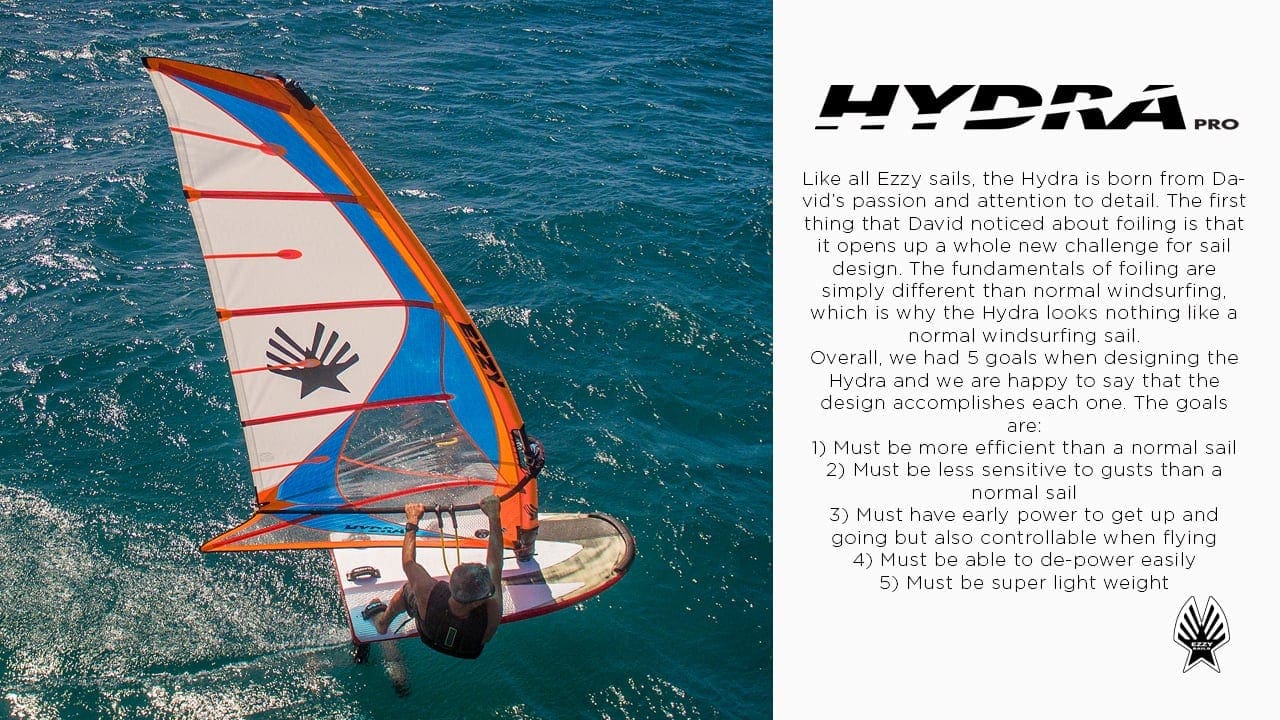
HYDRA SAIL SPECS
| Hydra Pro | Luff | Luff | Boom | Boom | Ezzy Mast | Base | Weight |
| Size (sq.m.) | Min (cm) | Max (cm) | Min (cm) | Max (cm) | Bottom/Top | Extension (cm) | Kg |
| 4.5 | 374 | 379 | 139 | 151 | 370/370 | 4-10 | 3.05 |
| 5.0 | 395 | 400 | 150 | 164 | 370/400 | 10-16 | 3.29 |
| 5.5 | 413 | 418 | 158 | 173 | 400/400 | 14-18 | 3.53 |
| 6.0 | 435 | 440 | 164 | 178 | 400/430 | 20-26 | 3.68 |
| 7.0 | 453 | 458 | 184 | 198 | 430/430 | 24-28 | 3.99 |
| 8.5 | 482 | 487 | 209 | 223 | 460/460 | 22-28 | 4.50 |
Note on Ezzy Masts
How To Choose The Perfect Mast Combination For Your Quiver:
- Pick the top and bottom that fits the sail you use the most.
- Use a longer top for your bigger sail.
- Use a shorter bottom for your smaller sail.
|
X
|
= Best Combination
|
= Good Combination
|
EZZY WINDSURFING SAIL -
EZZY HYDRA PRO 2021 -
WHAT IS DIFFERENT IN A FOIL SAIL? FOILING V.S. NORMAL WINDSURFING
First off, because the foil can fly through the water with so little drag, the wind angles are different, which means that the apparent wind (the wind created by your movement) shifts forward. Second, you need a powerful sail to pump up onto the foil, but once you’re on the foil, you want a very easy to control, light sail. And third, your board is above the surface of the water when you’re flying on the foil.
EXTENDED FOOT BATTEN
The elongated foot on the Hydra Pro takes advantage of the board’s height off the water to create a hyper efficient sail. On a normal windsurfing sail, a long foot like this would hit the water when cruising and simply not work, but when foiling, we can take advantage of this “free” space created by flying above the water. The extra long foot forms an end-plate with the board. This is very similar to how winglets work on a jet wing, and aerodynamic theory tells us that an end-plate like this greatly improves the efficiency of the sail.
The extra long foot provides the needed low-end power to get up on the foil without using cambers or an extra batten below the boom, saving close to a kilo in weight. Being able to ride a smaller, lightweight sail makes foiling more fun by giving you the sensation of flying with nothing in your hands. You want a sail that “goes away.”
The extra long foot also makes the sail more stable. This means that you are less vulnerable to gusts throwing you off balance when you’re flying on the foil, which makes foiling a lot easier. But at the same time, because only the foot is extended and not the entire sail, the pull of the sail remains forward for a more comfortable sailing experience.
3/4 BATTEN
The Hydra Pro also borrows the 3/4 batten concept from our hardcore wave sail, the Taka. A 3/4 batten allows the sail to luff, which means that it can easily go from full to flat. This is important for many aspects of foiling. This helps the Hydra Pro to be extra powerful when you’re pumping it but flat and responsive when flying on the foil. And, the Hydra’s 3/4 batten is the reason it can de-power so easily and change its shape for the needs of the foil. When you sail up wind, you want a flat sail, and when you sail downwind, you want a full sail. The 3/4 batten allows both to occur without having to adjust the outhaul.
First off, because the foil can fly through the water with so little drag, the wind angles are different, which means that the apparent wind (the wind created by your movement) shifts forward. Second, you need a powerful sail to pump up onto the foil, but once you’re on the foil, you want a very easy to control, light sail. And third, your board is above the surface of the water when you’re flying on the foil.
EXTENDED FOOT BATTEN
The elongated foot on the Hydra Pro takes advantage of the board’s height off the water to create a hyper efficient sail. On a normal windsurfing sail, a long foot like this would hit the water when cruising and simply not work, but when foiling, we can take advantage of this “free” space created by flying above the water. The extra long foot forms an end-plate with the board. This is very similar to how winglets work on a jet wing, and aerodynamic theory tells us that an end-plate like this greatly improves the efficiency of the sail.
The extra long foot provides the needed low-end power to get up on the foil without using cambers or an extra batten below the boom, saving close to a kilo in weight. Being able to ride a smaller, lightweight sail makes foiling more fun by giving you the sensation of flying with nothing in your hands. You want a sail that “goes away.”
The extra long foot also makes the sail more stable. This means that you are less vulnerable to gusts throwing you off balance when you’re flying on the foil, which makes foiling a lot easier. But at the same time, because only the foot is extended and not the entire sail, the pull of the sail remains forward for a more comfortable sailing experience.
3/4 BATTEN
The Hydra Pro also borrows the 3/4 batten concept from our hardcore wave sail, the Taka. A 3/4 batten allows the sail to luff, which means that it can easily go from full to flat. This is important for many aspects of foiling. This helps the Hydra Pro to be extra powerful when you’re pumping it but flat and responsive when flying on the foil. And, the Hydra’s 3/4 batten is the reason it can de-power so easily and change its shape for the needs of the foil. When you sail up wind, you want a flat sail, and when you sail downwind, you want a full sail. The 3/4 batten allows both to occur without having to adjust the outhaul.

HYDRA SAIL SPECS
| Hydra Pro | Luff | Luff | Boom | Boom | Ezzy Mast | Base | Weight |
| Size (sq.m.) | Min (cm) | Max (cm) | Min (cm) | Max (cm) | Bottom/Top | Extension (cm) | Kg |
| 4.5 | 374 | 379 | 139 | 151 | 370/370 | 4-10 | 3.05 |
| 5.0 | 395 | 400 | 150 | 164 | 370/400 | 10-16 | 3.29 |
| 5.5 | 413 | 418 | 158 | 173 | 400/400 | 14-18 | 3.53 |
| 6.0 | 435 | 440 | 164 | 178 | 400/430 | 20-26 | 3.68 |
| 7.0 | 453 | 458 | 184 | 198 | 430/430 | 24-28 | 3.99 |
| 8.5 | 482 | 487 | 209 | 223 | 460/460 | 22-28 | 4.50 |
Note on Ezzy Masts
How To Choose The Perfect Mast Combination For Your Quiver:
- Pick the top and bottom that fits the sail you use the most.
- Use a longer top for your bigger sail.
- Use a shorter bottom for your smaller sail.
|
X
|
= Best Combination
|
= Good Combination
|
